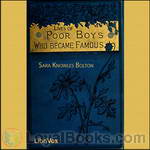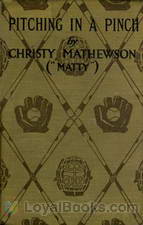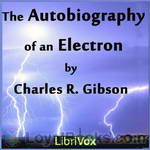|
Books Should Be Free Loyal Books Free Public Domain Audiobooks & eBook Downloads |
|
|
Books Should Be Free Loyal Books Free Public Domain Audiobooks & eBook Downloads |
|
Non-fiction |
|---|
|
Book type:
Sort by:
View by:
|
By: Henry William Herbert (1807-1858) | |
|---|---|
 Warwick Woodlands Things as they Were There Twenty Years Ago
Warwick Woodlands Things as they Were There Twenty Years Ago
| |
By: Sarah Knowles Bolton (1841-1916) | |
|---|---|
 Lives of Poor Boys Who Became Famous
Lives of Poor Boys Who Became Famous
These characters have been chosen from various countries and from varied professions, that the youth who read this book may see that poverty is no barrier to success. It usually develops ambition, and nerves people to action. Life at best has much of struggle, and we need to be cheered and stimulated by the careers of those who have overcome obstacles.If Lincoln and Garfield, both farmer-boys, could come to the Presidency, then there is a chance for other farmer-boys. If Ezra Cornell, a mechanic, could become the president of great telegraph companies, and leave millions to a university, then other mechanics can come to fame... | |
By: John Williams Streeter (1841-1905) | |
|---|---|
 The Fat of the Land The Story of an American Farm
The Fat of the Land The Story of an American Farm
| |
By: Gilbert Sykes Blakely | |
|---|---|
 Teachers' Outlines for Studies in English Based on the Requirements for Admission to College
Teachers' Outlines for Studies in English Based on the Requirements for Admission to College
| |
By: Christy Mathewson (1880-1925) | |
|---|---|
 Pitching in a Pinch
Pitching in a Pinch
In this book Mathewson is telling the reader of the game as it is played in the Big Leagues.... It’s as good as his pitching and some exciting things have happened in the Big Leagues, stories that never found their way into the newspapers. Matty has told them. This is a true tale of Big Leaguers, their habits and their methods of playing the game, written by one of them. | |
By: Louise Mack (1870-1935) | |
|---|---|
 Woman's Experiences in the Great War
Woman's Experiences in the Great War
An eye-witness account of the fall of Antwerp to the Germans in the opening months of World War I, Mack’s story has passages of extraordinary vividness and immediacy. Flawed by the most treacly sentiment in some places and the most ferocious anti-German invective in others, her account endures as an uncommonly forthright, passionate testimony to those tragic events and the ordinary people who were the true heroes of them. As a forty-something, coquettish war correspondent wrapped in sable furs... | |
By: Charles R. Gibson (1870-1931) | |
|---|---|
 The Autobiography of an Electron
The Autobiography of an Electron
"While many scientific men now understand our place in the universe, we electrons are anxious that every person should know the very important part which we play in the workaday world. It was for this reason that my fellow-electrons urged me to write my own biography. I am pleased to say that my relationship with the scribe who has put down my story in the following pages has been of the most friendly description. I have allowed him to place what he calls "The Scribe's Note" at the beginning of each chapter, but it will be understood clearly that these are merely convenient embellishments, and that I am responsible for the story of my own experiences." (Introduction adapted from the text) | |
By: Francis Leggett | |
|---|---|
 Tea Leaves
Tea Leaves
| |
By: United States. Air Force | |
|---|---|
 USAF Fact Sheet 95-03 Unidentified Flying Objects and Air Force Project Blue Book
USAF Fact Sheet 95-03 Unidentified Flying Objects and Air Force Project Blue Book
| |
By: Herman Friedl | |
|---|---|
 Manufacturing Cost Data on Artificial Ice
Manufacturing Cost Data on Artificial Ice
| |
By: Rufus T. (Rufus Tracy) Strohm (1877-) | |
|---|---|
 Engineering Bulletin No 1: Boiler and Furnace Testing
Engineering Bulletin No 1: Boiler and Furnace Testing
| |
By: Alan [Editor] Story | |
|---|---|
 The Copy/South Dossier Issues in the economics, politics, and ideology of copyright in the global South
The Copy/South Dossier Issues in the economics, politics, and ideology of copyright in the global South
| |
By: Thomas Stanley Treanor | |
|---|---|
 Heroes of the Goodwin Sands
Heroes of the Goodwin Sands
| |
By: Charles Alexander Cameron (1830-1921) | |
|---|---|
 The Stock-Feeder's Manual the chemistry of food in relation to the breeding and feeding of live stock
The Stock-Feeder's Manual the chemistry of food in relation to the breeding and feeding of live stock
| |
By: Thomas Barker (fl. 1651) | |
|---|---|
 The Art of Angling Wherein are discovered many rare secrets, very necessary to be knowne by all that delight in that recreation
The Art of Angling Wherein are discovered many rare secrets, very necessary to be knowne by all that delight in that recreation
| |
By: Edward Allen Bell | |
|---|---|
 A History of Giggleswick School From its Foundation, 1499 to 1912
A History of Giggleswick School From its Foundation, 1499 to 1912
| |
By: James Nasmyth (1808-1890) | |
|---|---|
 James Nasmyth: Engineer; an autobiography
James Nasmyth: Engineer; an autobiography
| |
By: W. C. (William Constantine) Egan (1841-1930) | |
|---|---|
 Making a Garden of Perennials
Making a Garden of Perennials
| |
By: Susan Edmonstoune Ferrier | |
|---|---|
 Marriage, Volume 1
Marriage, Volume 1
“Love!–A word by superstition thought a God; by use turned to an humour; by self-will made a flattering madness.” – Alexander and Campaspe. Lady Juliana, the indulged and coddled seventeen (”And a half, papa”) year old daughter of the Earl of Cortland, is betrothed by her father to a wealthy old Duke who can give her every luxury. She instead runs away and marries her very handsome but penniless lover. Very soon, they are forced to travel to Scotland to live with his quirky family in a rundown “castle” in the barren wilderness. Can this marriage survive?(Summary by P.Cunningham) | |
By: Mary Johnson Bailey Lincoln | |
|---|---|
 Carving and Serving
Carving and Serving
| |
By: William Saunders (1822-1900) | |
|---|---|
 Catalogue of Economic Plants in the Collection of the U. S. Department of Agriculture
Catalogue of Economic Plants in the Collection of the U. S. Department of Agriculture
| |
By: W. J. Connor | |
|---|---|
 The Stoker's Catechism
The Stoker's Catechism
| |
By: George E. (George Evertson) Woodward (1829-1905) | |
|---|---|
 Woodward's Graperies and Horticultural Buildings
Woodward's Graperies and Horticultural Buildings
| |
By: Francis B. (Francis Bail) Pearson (1853-) | |
|---|---|
 Reveries of a Schoolmaster
Reveries of a Schoolmaster
| |
By: C. C. (Christopher Columbus) Andrews (1829-1922) | |
|---|---|
 Reflections on the Operation of the Present System of Education, 1853
Reflections on the Operation of the Present System of Education, 1853
| |
By: Francis B. (Francis Bail) Pearson (1853-) | |
|---|---|
 The Reconstructed School
The Reconstructed School
| |
 The Vitalized School
The Vitalized School
| |
By: Fannie Hardy Eckstorm (1865-1946) | |
|---|---|
 The Woodpeckers
The Woodpeckers
The Woodpeckers is a wonderful introduction to the world of bird study for the young naturalist, covering such topics as how he finds food, courting, how he builds his nest, the interesting ways he uses his different body parts as tools, among other topics discussed in the book. If you wish to investigate further, the book has a few diagrams and an Appendix that contains more technical information such as detailed descriptions of the different species of North American woodpeckers which were not read as part of this audiobook. | |
By: Louisiana Purchase Exposition Commission | |
|---|---|
 Final Report of the Louisiana Purchase Exposition Commission
Final Report of the Louisiana Purchase Exposition Commission
| |
By: Digital Equipment Corporation | |
|---|---|
 Preliminary Specifications: Programmed Data Processor Model Three (PDP-3) October, 1960
Preliminary Specifications: Programmed Data Processor Model Three (PDP-3) October, 1960
| |